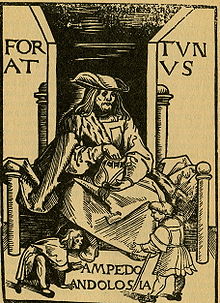Fortunatus
The Fortunatus is next to " Till Eulenspiegel ", " Reineke Fuchs " and the " Hug Schapler " by Elisabeth von Nassau-Saarbrücken one of the most important prose novels / folk books . It was the first German-language prose novel to be published without a template in Augsburg in 1509 .
Authorship
The author, presumably based in Augsburg, is unknown, the colophon of the Augsburg first edition from 1509 only names one Johann Heybler as the client for the print:
- Zů trucking prescribed
- by Johannßen Heybler Appotegker
- in the imperial town of Augspurg in the large shooting
- the lessen jartzal christi in the new jar.
action
It tells the story of Fortunatus and his family, mentioning three generations. In the first section we get to know Fortunatus in Cyprus, how he talks to his parents, Theodorus and Graciana and how his father tells him that he has brought through the family fortune. For Fortunatus this is the reason to leave Cyprus so as not to be a burden on his parents. Together with the Count of Flanders, he leaves the island and embarks on a world tour. He experiences many adventures and not only gets into trouble once.
Fortunatus act
Important in the first part of the book, which is entirely determined by the Fortunatus plot, is the bestowal of the lucky bag by Fortuna, the mistress of happiness, who grants him and the generation of his children constant wealth. The purse has magical power: whenever he reaches into the lucky bag, he finds money in local currency. With this lucky bag he can now financially secure further and bigger adventures and travel the world with his entourage. The wallet is the basis of his social advancement. In Cyprus he builds a palace for his family and can marry Cassandra, the daughter of a count, which means the ascent for the middle-class family. With her he has two sons, the calm and fearful Ampedo and the daring , risk- taking Andolosia .
Andolosia plot
The second part of the book is determined by the Andolosia plot and takes place mainly in Cyprus, Spain and London. This part of the book tells the decline and decline of the family of Fortunatus, the story ends with the physical extinction of the family when Andolosia is killed by robbers and Ampedo dies in grief.
Social context
Through the emergence of cities with traders and merchants, the bourgeoisie gained more and more wealth and thus also power. At the same time, a money economy developed (double-entry bookkeeping, banking, etc.). The story of the rise of the bourgeois figure Fortunatus thus reflects the transition from the stratification (classification into a social class by birth, i.e. clergy, nobility or peasantry) to a functionally differentiated society (elected politics, free economy, modern science, modern legal system, etc. ).
Material history
The Fortunatus material, a story in which the Cyprus-born hero receives a never-ending purse from the goddess of luck and travels to Europe, was taken up by numerous later authors, including Hans Sachs , Thomas Dekker , Ludwig Tieck , Ludwig Uhland , Adelbert by Chamisso and Friedrich Hebbel .
expenditure
- Fortunatus. Study edition based on the Editio Princeps from 1509. Ed. By Hans-Gert Roloff . Bibliography by Jörg Jungmayr . Stuttgart: Philipp Reclam jun. 2004 ( RUB 7721).
- Fortunatus. In: Library of the early modern period. Volume 1: Novels of the 15th and 16th centuries. After the first prints with all woodcuts. Edited by Jan-Dirk Müller . Frankfurt am Main: Deutscher Klassiker Verlag 1990.
- The German folk books : Fortunati Glückseckel and Wunschhütlein, Jena: Eugen Diederichs 1912, 244 pages with woodcuts, first edition of this edition in this series produced by Richard Benz , printed by W. Drugulin in Leipzig
Secondary literature
- Walter Raitz: Fortunatus. Wilhelm Fink, Munich 1984, ISBN 3-7705-2096-3 .
- Anna Mühlherr: "Melusine" and "Fortunatus". Mysterious and denied meaning. Tubingen 1993.
- Sebastian Speth: Dimensions of narrative meaning in the early New High German prose novel. Textual historical interpretation of 'Fortunatus' and 'Herzog Ernst'. Berlin 2017.
- Gudrun Bamberger: Poetology in the prose novel. Fortunatus - Wickram - book of fists . Wuerzburg 2018.


